The Samsung Galaxy Note7 (S820) Review
by Joshua Ho on August 16, 2016 9:00 AM ESTSystem Performance Cont'd
Now that we've covered more general purpose benchmarks that tend to emphasize CPU performance and GPU compute performance, we can look at benchmarks that tend to more strongly emphasize things that games will see benefits from such as improved GPU graphics performance and improved CPU physics processing performance.
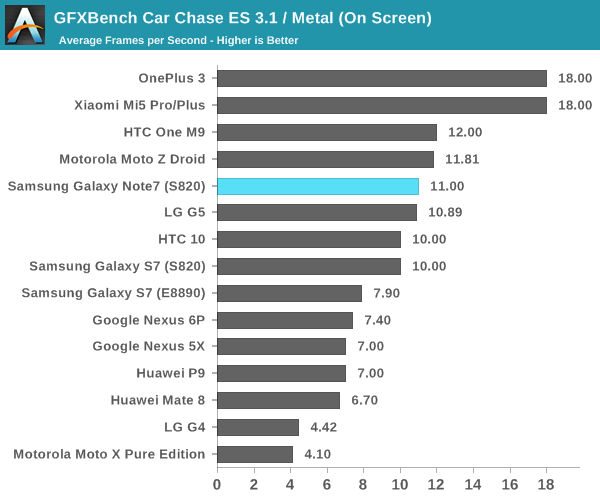
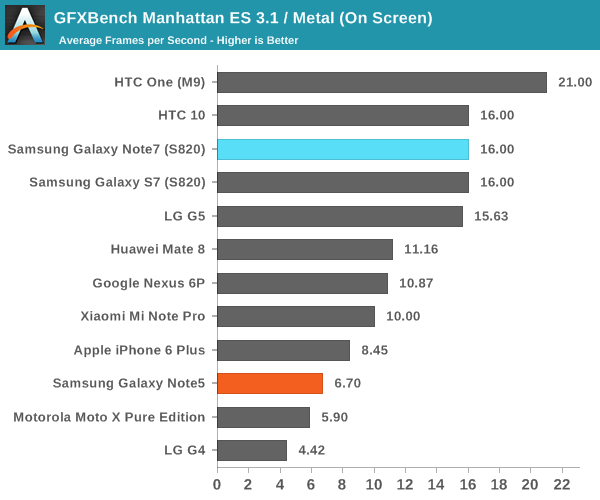
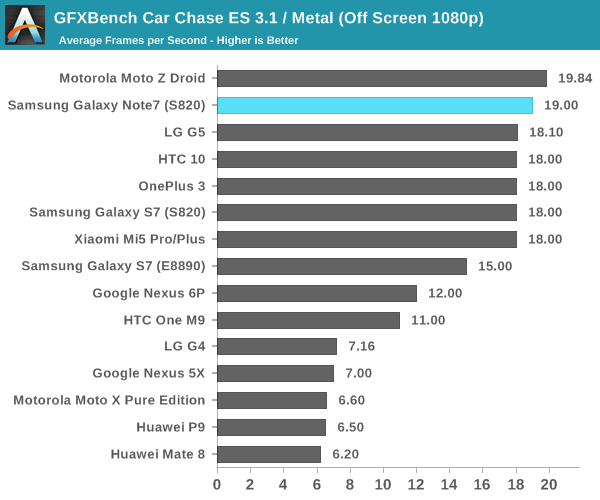
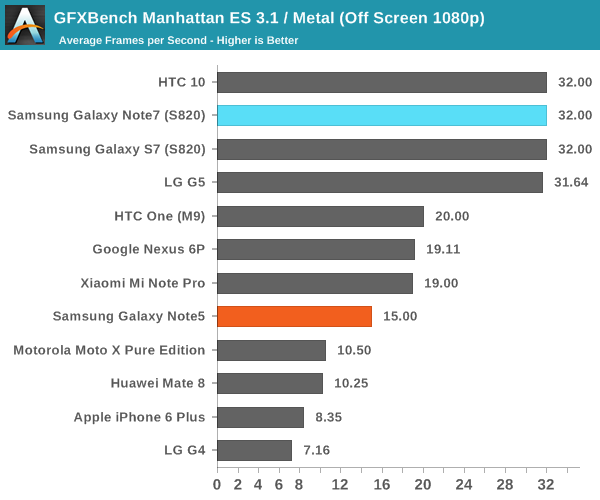
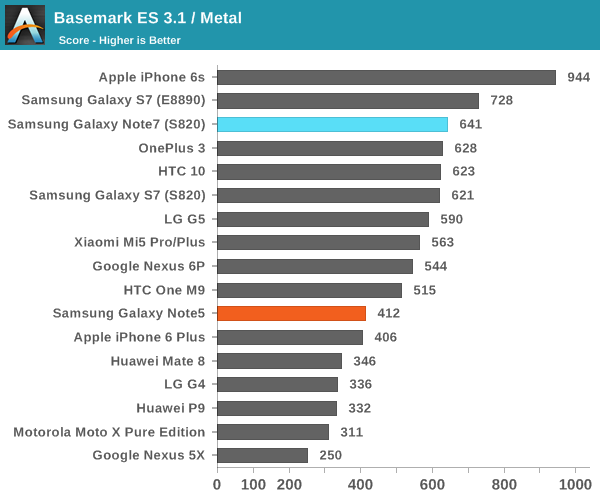
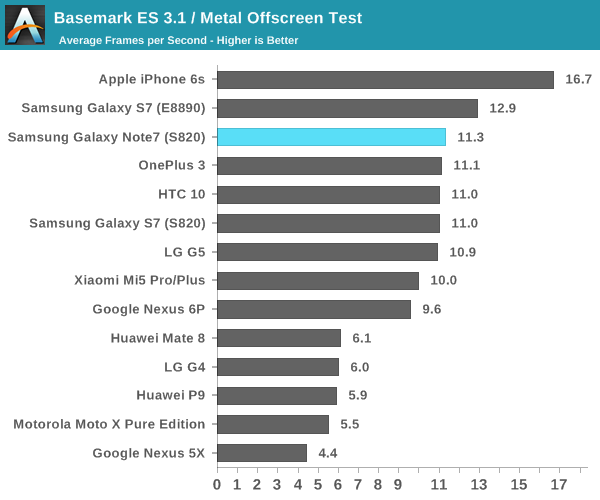
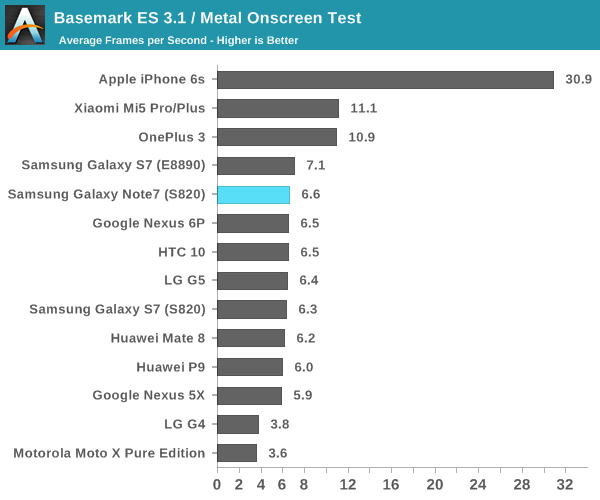
It's probably no surprise, but the Galaxy Note7 performs as expected with the latest drivers and in ideal thermal conditions. The Adreno 530 should be more than sufficient for the forseeable future but for maximum performance it's best to enable 1080p rendering or lower to maximize frame rates in games like Real Racing 3 that tend to really use the GPU to its fullest extent.
NAND Performance
Of course, while Discomark provides a sort of holistic view of performance for a specific task, it’s also important to at least try and break down the various aspects that impact system performance so rather than simple black box testing we can further understand what factors influence performance and therefore provide additional information to make better buying decisions. One of the major contributors to general purpose performance is going to be storage performance, which is often something often ignored by marketing as the nitty gritty details of NAND storage realistically require some background in solid state physics and devices to understand, as well as some understanding of computer science and engineering.
While I’m not really happy with the state of our mobile storage benchmarks, for now I don’t really see another option here as the publicly available storage benchmarks for Android and iOS are fairly basic. Putting aside the state of the benchmarking industry, our current benchmark remains AndroBench 4 which provides at least some basic storage benchmarking capabilities. We use custom settings with this benchmark which attempts to make the test more realistic as the default settings are just wildly unrealistic. This includes adjusting the buffer size, increasing the file size to 100 MB, and only using one thread instead of 8. 256KB file size is targeted as this is the most common block size if you profile this kind of thing for sequential writes and reads, while 4KB block sizes are the most common for other tasks as the vast majority of computer architectures use 4KB pages for virtual memory. Single-threaded I/O is common in most cases because multi-threaded programming is still difficult for most people to reason about in an effective manner because conscious thought is inherently serial in nature with some multiplexing. In addition to this, many eMMC solutions on the market don’t really perform well with multiple threads simultaneously as the controller can’t do anything with extra requests other than reply with a busy signal which already happens with a single thread.
Putting aside discussions of testing we can take a look at the storage solution used in the Galaxy Note7 before getting into the actual results. The Note7 continues to use basically the same storage solution as the Galaxy S7 and S6, which is to say an MLC-based solution that has a UFS Gear 3 single lane interface for bandwidth up to 600 MB/s and basically has the exact same model number if you check the SCSI devices attached to the system save for some changes that indicate the higher 64GB storage relative to the 32GB chips that are most common in the Galaxy S7.
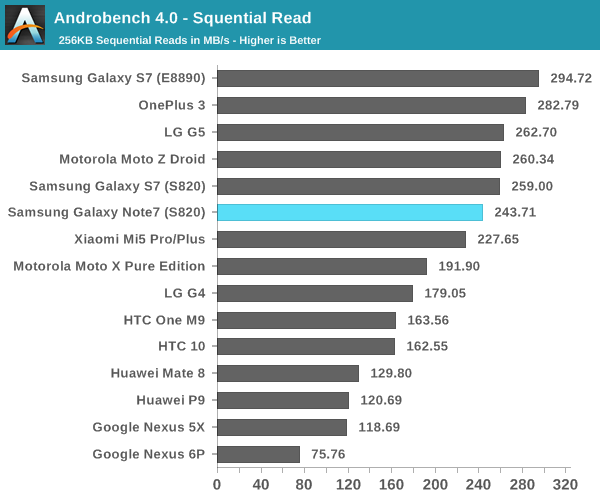
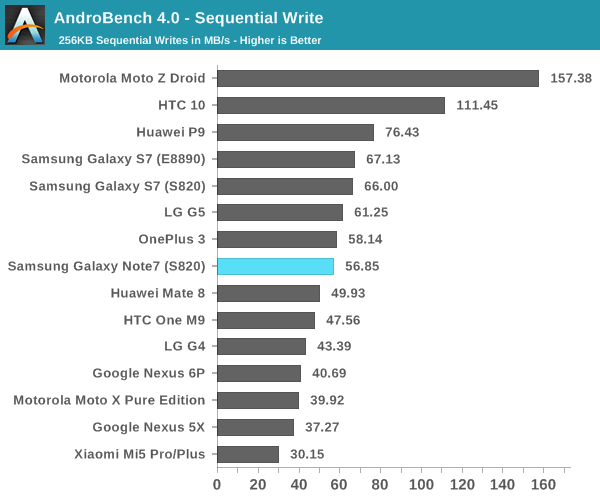
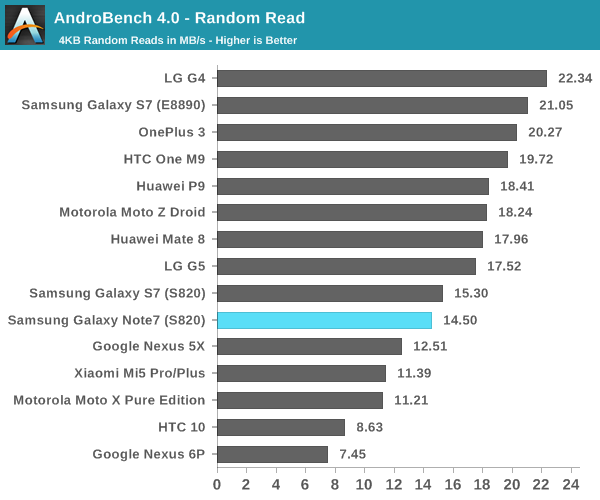
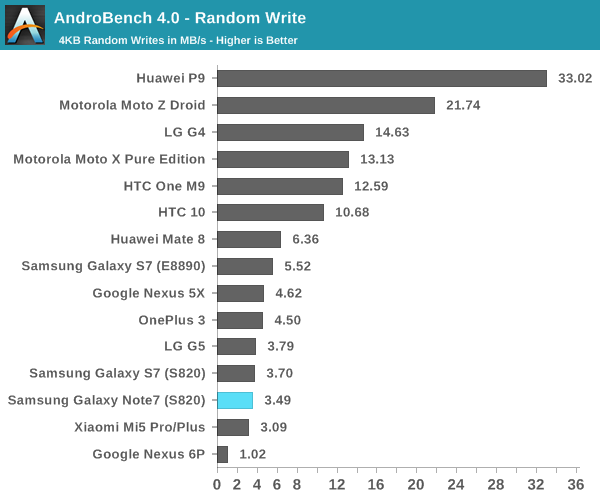
Looking at the test results it performs exactly as quickly as you’d expect from this MLC solution as we’ve tested it in the Galaxy S6, S6 edge, S6 edge+, Note5, S7, S7 edge, and now the Note7 as well as the LG G5. The performance here is acceptable but obviously if you look at burst performance the iPhone 6s has a faster solution due to the hybrid SLC/TLC storage solution. The main benefit of pure MLC NAND is that performance is more consistent as there’s no precipitous drop when the SLC buffer fills. There’s always room to improve but I don’t really see how it’s going to happen unless Samsung moves to V-NAND for the next generation.










202 Comments
View All Comments
KoolAidMan1 - Tuesday, August 16, 2016 - link
Apple is also responsible for Android's abysmal security and its impending botnet apocalypse.#illuminati
Bluetooth - Tuesday, August 16, 2016 - link
iPhone is twice as fast with the Google Octane benchmark which is the closest to real world usage. I didn't know that Google was optimising their benchmark to make iOS phones leave Android in the dust.trparky - Wednesday, August 17, 2016 - link
Yeah, I was looking at some of the benchmark numbers and the first thing that came to my mind was "Apple is killing them here, they're just killing them!"This is supposed to be the latest and greatest CPU/GPU combination and yet Apple's year old CPU/GPU combination is wiping the floor with Samsung's new phone. Not only is Apple killing them in the browser benchmarks but also in Basemark tests as well. If I was a Samsung fan boy I would be asking why the hell a year old device (iPhone 6s) is seemingly faster than my latest and greatest flagship device.
Now, a number of users are saying that may be because of the CPU governor that Samsung chose to use as the default CPU governor so as to improve overall battery life but as we can see in some of the benchmarks, Apple is killing them yet the iPhone doesn't at all have issues with battery life. So again, why is Apple killing them with a year old device?
God, if the benchmarks look this ugly when compared to the year old iPhone 6s I can't imagine how bad it's going to be when compared to the new chip Apple is going to have in the new iPhone 7 (or whatever it's going to be called). If I had to hazard a guess, it's going to be an absolute bloodbath.
jospoortvliet - Thursday, August 18, 2016 - link
Everyone should know by now that in single threaded use apple is miles ahead of any android vendors, period. Same with storage performance. Multicore performance, which thankfully is a little more important on Android than on iOS, is better with exynos and friends but that is only a little consolation.Psyside - Sunday, August 21, 2016 - link
That is pure BS, i got the 8890 S7 and its utterly fantastic and uber fast.jlabelle2 - Monday, August 22, 2016 - link
Still, it is a little bit sad that, as an iPhone user myself (corporate phone as I am using a Windows phone as a private own), it is now the only thing Apple fans can really brag about. Especially considering that it does not offer any appreciable benefit as most modern flagships are anyway in all practical purpose quick enough for what we are using them.Apple can continue to push this CPU race, we just reached a point of diminish return and this is really not what mobile phone needs now.
People needs smaller phone for a given screen size (iPhone has huge bezel and the Note 7 is a marvel on this regard), they need more battery life and/or better or quicker way to charge (quick charging, wireless charging), they need screen readable outdoor with good contrast (iPhone is good outdoor but contrast is not up to OLED level), they need to be able to perform tasks quicker (camera hardware button, back button, NFC, ...), they need to be able to use their phone with one hand (not having the back link or all the buttons on top like on iOS), they need to be able to take the best pictures possible because this is the camera they are wearing (Apple is still really pushing the envelope with refusing to put a decent camera size sensor in their phone for whatever sake of thinness)...
Let's be frank, I do not know one single person with a big of brain and common sense that would choose an iPhone versus another Snapdragon 820 or Exynote xxx just for the sake of difference of single thread CPU speed. That is just NOT an argument that register in any meaningful way these days to normal people.
grayson_carr - Tuesday, August 16, 2016 - link
How would that help? Even the Exynos S7 doesn't run as smooth as the Moto Z, which is pushing just as many pixels and has s Snapdragon 820. There are two issues, neither of which is the fault of the SD820. First, Samsung phones are bloated with a ridiculous number of features and background services running, which requires more processing power than something running a cleaner build of Android like the Moto Z or a Nexus. Second, because of the extra overhead caused by their software, Samsung has to limit the performance of their chips (both Exynos and Snapdragon) via kernel / governor configuration in order to get good battery life. Samsung could easily tweak the SD820 so that the Note 7 ran perfectly smooth and hardly ever dropped frames. The SD820 is easily capable of that. But if they did that, then the Note 7 would get below average battery life. It's all about priorities. Samsung is betting that their users will prefer good battery life and some minor stuttering here and there over below average battery life and a perfectly smooth UI. I mean, yes, the Exynos is more efficient than the SD820 so they didn't have to limit its performance quite as much to achieve good battery life, but even the Exynos is performing far below it's potential because of Samsung's heavy software and desire for good battery life. The fact that the Moto Z runs smoother than even the Exynos S7 is proof.mrochester - Wednesday, August 17, 2016 - link
Why can't we have both like the iPhone? Too many compromises.Psyside - Sunday, August 21, 2016 - link
NVMe storage, the A9 is far bellow 8890, the storage is the key.trparky - Wednesday, August 17, 2016 - link
But that doesn't explain why the iPhone 6s appears to be wiping the floor with this device and yet iPhone 6s users often enjoy some of the best battery life numbers in the industry.Again, as I said above... If I was a Samsung fan boy I would be asking why the hell a year old device (iPhone 6s) is seemingly faster than my latest and greatest flagship device.